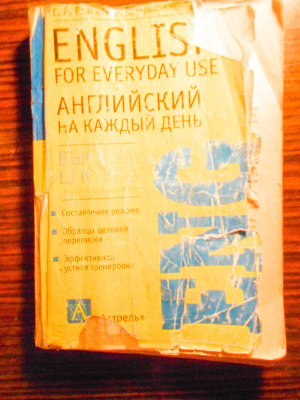English for everyday use: Учебное пособие — 2-е изд. — М.: ООО
"Издательство АСТ": ООО "Издательство Астрель"; СПб.: СпецЛит,
2002. — 255, [1] с.: ил.
Настоящее пособие предназначено для студентов и аспирантов
неязыковых вузов, а также для учащихся, самостоятельно
совершенствующих навыки устной речи (уровень Intermediate).
Тематика 29-ти уроков отвечает требованиям сегодняшнего дня
(например: как составлять резюме, как проходить интервью при
поступлении на работу и т.п.) и охватывает широкий круг жизненных
ситуаций, в которых может оказаться специалист, работающий за
рубежом или в России (в совместных предприятиях, иностранных фирмах
и т.п.). В разделе Correspondence даны образцы деловой переписки, а
также письма-поздравления, письма-соболезнования, образцы факсов и
т.д. Рациональная система грамматических упражнений, рассчитанных в
основном на устную тренировку, и тематика текстов делают пособие
эффективным и современным. English for Everyday Use может быть
использовано в любой аудитории, где ставится цель овладения устной
английской речью.
Unit 1. Present Indefinite; Possessive Case; verbs be, have
Unit 2. There is/are; impersonal sentences; some, any, no
Unit 3. Present Continuous; modal verbs can, must, needn't; Present Continuous vs. Present Idefinite
Unit 4. Be going to; Present Continuous with verbs of motion; imperative don't; can (Past, Future); much, many, little, few, a little, a few
Unit 5. Past Indefinite; there was/were; someone, anyone, no one
Unit 6. Future Indefinite; Present instead of Future in clauses of time and condition; the position of the object, shall, will - modal meaning; have something done; must + Perfect Infinitive
Unit 7. Sequence of Tenses
Unit 8. Present Perfect; emphatic pronouns; Sequence of Tenses (continued)
Unit 9. Emphatic structure; seem + Infinitive; Present Perfect Continuous. Indirect questions (reported speech)
Unit 10. Should
Unit 11. Passive Voice; none of
Unit 12. Pas Continuous; Present Perfect (continued); should (continued)
Unit 13. Present Indefinite Passive; Past Indefinite Passive; be + Past Participle
Unit 14. Degrees of comparison of adjectives
Unit 15. Modal verbs with Passive Infinitive; can, must (continued); Present Participle
Unit 16. Present Perfect Passive; Complex Object; negative-interrogative form of questions; also, too, either, neither
Unit 17. Complex Object (continued); be used to + Gerund; would rather + Infinitive
Unit 18. Gerund; don't mind + Gerund; it's time to start + Gerund; enjoy, hate, keep + Gerund; Future Indefinite; Present instead of Future (revision)
Unit 19. Future Indefinite Passive; may (expressing probability, uncertainty)
Unit 20. Present Perfect and Present Perfect Continuous (revision); one (as the subject of the sentence); used + Infinitive
Unit 21. Should + Perfect Infinitive; make somebody do something; had better + Infinitive
Unit 22. Indirect Speech; Indirect questions; Indirect requests
Unit 23. Must (expressing supposition); may (expressing supposition and possibility); could (expressing supposition and ability); had better + Infinitive (revision); have something done (revision); feel like + Gerund
Unit 24. The Subjunctive Mood; would + Infinitive (expressing a repeated action in the past)
Unit 25. Present Perfect Continuous (revision); Gerund used as attribute; be + Invinitive; have + Infinitive
Unit 26. Degrees of comparison of adjectives (revision); Passive Voice (revision)
Unit 27. In, on, by, without + Gerund; can't help + Gerund
Unit 28. Complex Subject; Past Continuous vs. Past Indefinite (revision); Subjunctive Mood after wish
Unit 29. Infinitive of purpose; Indirect speech; Indirect questions (revision)
Unit 2. There is/are; impersonal sentences; some, any, no
Unit 3. Present Continuous; modal verbs can, must, needn't; Present Continuous vs. Present Idefinite
Unit 4. Be going to; Present Continuous with verbs of motion; imperative don't; can (Past, Future); much, many, little, few, a little, a few
Unit 5. Past Indefinite; there was/were; someone, anyone, no one
Unit 6. Future Indefinite; Present instead of Future in clauses of time and condition; the position of the object, shall, will - modal meaning; have something done; must + Perfect Infinitive
Unit 7. Sequence of Tenses
Unit 8. Present Perfect; emphatic pronouns; Sequence of Tenses (continued)
Unit 9. Emphatic structure; seem + Infinitive; Present Perfect Continuous. Indirect questions (reported speech)
Unit 10. Should
Unit 11. Passive Voice; none of
Unit 12. Pas Continuous; Present Perfect (continued); should (continued)
Unit 13. Present Indefinite Passive; Past Indefinite Passive; be + Past Participle
Unit 14. Degrees of comparison of adjectives
Unit 15. Modal verbs with Passive Infinitive; can, must (continued); Present Participle
Unit 16. Present Perfect Passive; Complex Object; negative-interrogative form of questions; also, too, either, neither
Unit 17. Complex Object (continued); be used to + Gerund; would rather + Infinitive
Unit 18. Gerund; don't mind + Gerund; it's time to start + Gerund; enjoy, hate, keep + Gerund; Future Indefinite; Present instead of Future (revision)
Unit 19. Future Indefinite Passive; may (expressing probability, uncertainty)
Unit 20. Present Perfect and Present Perfect Continuous (revision); one (as the subject of the sentence); used + Infinitive
Unit 21. Should + Perfect Infinitive; make somebody do something; had better + Infinitive
Unit 22. Indirect Speech; Indirect questions; Indirect requests
Unit 23. Must (expressing supposition); may (expressing supposition and possibility); could (expressing supposition and ability); had better + Infinitive (revision); have something done (revision); feel like + Gerund
Unit 24. The Subjunctive Mood; would + Infinitive (expressing a repeated action in the past)
Unit 25. Present Perfect Continuous (revision); Gerund used as attribute; be + Invinitive; have + Infinitive
Unit 26. Degrees of comparison of adjectives (revision); Passive Voice (revision)
Unit 27. In, on, by, without + Gerund; can't help + Gerund
Unit 28. Complex Subject; Past Continuous vs. Past Indefinite (revision); Subjunctive Mood after wish
Unit 29. Infinitive of purpose; Indirect speech; Indirect questions (revision)

